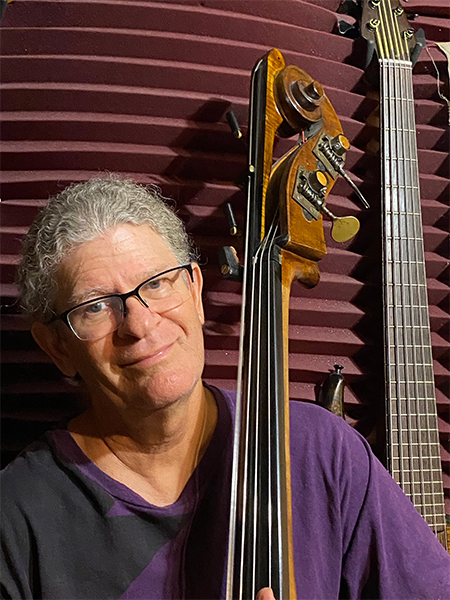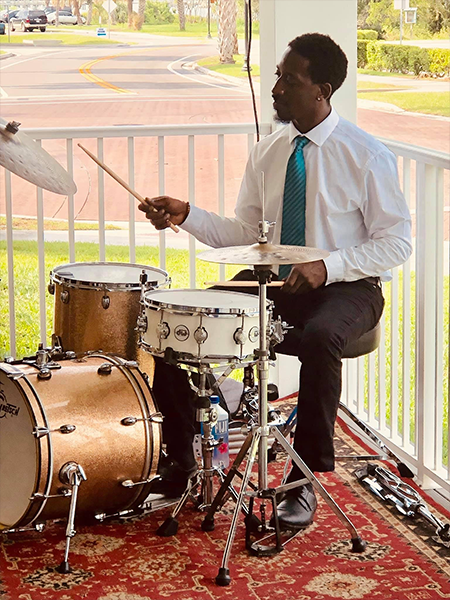.png)
November 20, 2024 - Jazz at the Majestic
Meet the Musicians
.png)
Larry Brown - Piano
Pianist Larry Brown leads one of the most accomplished straight-ahead jazz groups in the Mid-Atlantic area, having performed at An Die Musik, Blues Alley, the Meyerhoff, the Kennedy Center, the Mid-Atlantic Jazz Festival, East Coast Jazz Festival, Baltimore-Washington Jazz Fest, Alexandria Jazz Festival, Martha’s Vineyard Jazz Festival, Twins Jazz, Bohemian Caverns, the King Of France Tavern, Montpelier Arts Center, Chris’ Café, the New Haven Lounge, Caton Castle, Keystone Korner, Strathmore Mansion, and the Black Rock Center for the Arts.
JazzReview.com describes The Larry Brown Quintet as "Straight-ahead jazz at its best, with a forthright approach to well chosen material, supported by first rate soloists and a rock-solid rhythm section." The group’s four CDs receive airplay all over the country, as well as in Brazil, Canada, Russia, and Japan. The band, which reprises the hard-bop style of the legendary Blue Note era, was recognized by the Washington Area Music Association (WAMA) as the Best Jazz Group for 2009. The group’s celebrated release, “Hard Bop Café” was recognized by WAMA as the Best Jazz Recording for 2006 with a Wammie award.
Born in Washington, DC, as an undergraduate at Towson University, Larry studied with Stan Kenton’s favorite arranger/composer, Hank Levy. He performed with and composed for the lauded Towson University Jazz Ensemble. With a Bachelors Degree in Music Theory Larry attended graduate school at Catholic University, where he received his Master of Music degree after studying Composition and Electronic Music with the legendary Emerson Myers.
Recognized with Wammie Awards for Best Jazz Group for 2006, 2008, and again for 2009, Larry also received a Wammie for Best Jazz Recording in 2002 for his CD “The Long Goodbye”, recorded at National Public Radio, npr. Larry has appeared on the national jazz cable channel BET On Jazz show “Jazz Discovery” where he won in the instrumentalist category, and has appeared on their show “Jazz Scene” as a featured artist. Larry has also received several Wammie nominations for Best Jazz Instrumentalist, and Best Jazz Recording (“Peace”, “Dryden Street Sessions”).
Washingtonian magazine says, “Larry Brown is a pianist whose rendering of ballads is particularly moving”. The Washington Post calls him “an artist deserving of greater exposure” and says Brown “evokes the master touch”. A post be-bop jazz pianist, Larry lists his major influences as Bill Evans, Wynton Kelly, and Miles Davis.
The Larry Brown Quintet features Larry Brown on piano, Doug Mathews on bass, Claudio Berardi on drums, Scott Dickinson on trumpet, and Dan Jordan on tenor sax and flute. Larry records exclusively on Lush Life Records and his recordings are produced by Jerry O’Sullivan.
Please visit our website: www.larrybrownjazz.org

Daniel Jordan - Tenor Sax, Flute
Daniel has been a successful educator and musician since 1976.
He has a flexible and common sense approach to teaching and playing.
He has a flexible and common sense approach to teaching and playing.
Selected Musical Highlights:
Toured with:
Larry Coryell Quartet,
Arturo Sandoval Quintet,
Natalie Cole reed 1 and featured soloist
Maynard Ferguson tenor soloist
Michael Wolff with Badal Roy
Selected engagements:
Elvin Jones, Jimmy Smith, Sam Rivers, New York Fusion Ensemble,
NY Afro Cuban Jazz Orchestra ,Wayne Andre Big Band, Aretha Franklin,
Dr.Lonnie Smith, Adam Nussbaum, Edward Simon,Woody Herman
Orchestra.
Selected recordings:
Maynard Ferguson:STORM ,LIVE AT THE GREAT AMERICAN MUSIC
HALL.
Scott Whitfield: LIVE FROM BIRDLAND NYC & A TRIBUTE TO NAT
ADDERLY.
Larry Coryell: Barefoot Man : SANPAKU.
Michael Ross: Ginger
Daniel Jordan :Pure Joy

Doug Mathews - Bass
Doug Mathews, a Florida native, studied Electric and Double Bass at Valencia Community College in Orlando and at Berklee College of Music in Boston. in 1982 Doug returned to the Central Florida area and began playing shows at Walt Disney World and corporate events. This added to the list of church, recording, project bands and jazz and club date gigs he was already been involved in. His last full time gig at Disney was with the Grand Floridian Society Orchestra. Doug was also Sam Rivers’ regular bassist from 1994 until Sam’s passing in 2011 and continues to run the Rejuvenation Orchestra (the former “Rivbea Orchestra”) He performed with Mr. Rivers at numerous international jazz festivals, clubs and recorded 2 Grammy nominated CDs with the Rivbea New York All-Star Orchestra. Doug has worked with a wide range of artists from Petula Clark, Ira Sullivan and Lynne Arriale to Steven Bernstein and Karl Berger. He is currently freelancing mostly jazz gigs..

Hosney Franck - Drums
After graduating from high school Hosny was received a scholarship to Indian River State College to study percussion. He served as the main drummer for the top jazz band there. He then entered a full ride scholarship contest for Musicians Institute where he won and attended In The heart of Hollywood, California and studied under Chris Coleman (Jeff Beck, Chaka Kahn, Stanley Clark , Sheila E.) and Ryan Brown (Frank Zappa). He then went on to the University of Central Florida to study jazz studies and play in the Flying Horse Big Band where he’s had the opportunity to play behind Ira Sullivan.
Hosny now lives in Florida where he is building his craft in all genres and aspects of drumming and bass playing. His range of styles includes Jazz, Fusion, Latin, Gospel, R&B, Hip-Hop. He was then called in to be a drum tech for Grammy nominated hip hop artist Big Sean where he has worked on the Ellen show, SNL, Jimmy Fallon, Good morning America, MTV movie and music awards, I heart radio awards show and later became the drummer for hiphop artist “Rod Wave” where he’s done two successful tours and performed on NPR’s Tiny desk concert. Hosny strives to remain humble and passionate in his journey and career as a drummer and to inspire others!




